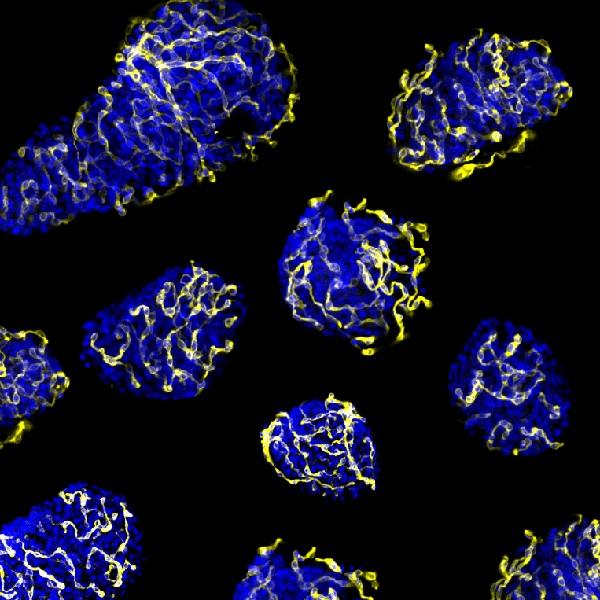
Credit: Figueiredo et al.
The first cause of the loss of functionality in transplanted pancreatic islets is the low capacity to create new vessels to allow the arrival of nutrients in the cells. This is one of the main reasons causing the failure in transplantations in the treatment of type 1 diabetes.
Researchers from the University of Barcelona and IDIBAPS led a study that identifies a protein as the potential modulator in the revascularization of pancreatic islets. In a study conducted on diabetic mice with islet transplant from other animals or human islets, researchers showed that grafts without this protein have a higher revascularization -favouring the viability of cells- and regular sugar levels and glucose tolerance are recovered.
The study is coordinated by Ramon Gomis, professor at the Faculty of Medicine and Health Sciences of the University of Barcelona, head of the IDIBAPS research group Pancreatic Islets: biomarkers and function, and researcher at the Diabetes and Associated Metabolic Diseases Networking Biomedical Research Centre (CIBERDEM), and Rosa Gasa, researcher in the same group.
The first author of the study, published in the journal Science Translational Medicine, is the expert Hugo Figueiredo, researcher in the IDIBAPS group.
Regenerative medicine for type 1 diabetes treatment
One of the used strategies in the type 1 diabetes treatment -based on regenerative medicine- is the pancreatic islet transplantation. These are formed by different types of cells with an endocrine function that produce hormones such as insulin and glucagon. In type 1 diabetes, beta cells in islets -responsible for the production of insulin- are selectively destroyed by an autoimmune process.
For this reason, islet transplantation can restore the physiological function in patients with this type of diabetes. “Although this transplant is carried out in some centers, it has limitations, such as the chronic administration of immunosuppressants, and it is applied in those cases in which the disease is not properly controlled. At this moment, it is indicated in the context of a kidney transplant and we opt for a dual vascular kidney – pancreas transplant”, says Ramon Gomis, coordinator of the study.
In the context of the islet transplantation, there are two basic challenges to face and which are related to the chronic administration of immunosupressants and the fact that the transplant is not re-vascularized properly, which makes it harder for the nutrients and oxygen to arrive. This deficiency causes the islets to stop being viable and to die.
The regular environment for islets is formed by a heavy network of capillaries in charge of the arrival of oxygen, hormones and nutrients and the transport of the generated hormones to the blood vessel. During the transplant process, islets are separated from their vascular network and their right function and the following survival depends on the ability to create new vessels for the vascular system in the receptor. “Islet implantation is revascularized, but not fast enough. In the article, we focused on getting enough vessels to keep the islets in optimal conditions and improve the success of this strategy for the treatment of type 1 diabetes”, notes researcher Rosa Gasa, coordinator of the study.
Improving the revascularization is one of the challenges
In the study, researchers identified a molecular target -PTP1B phosphatase- which would allow transplanted pancreatic islets to be viable. The results show the inhibition of this enzyme -present in all cells including pancreatic beta cells- promotes the activity of the pro-angiogenic growth factor VEGF, which enables the creation of new blood vessels. Therefore, it gives a higher re-vascularization of the treatment that improves the islet survival and functionality. “Regulation of the re-vascularization is induced by hypoxia the lack of nutrients and the inhibition of phosphatase widens this response. When the stimuli disappears, the creation of new blood vessels stops”, notes Rosa Gasa.
“This article is a concept proof that can remove one of the reasons why the pancreatic islet transplant fails. There are less specific inhibitors of PTP1B and phosphatases and therefore, the next step will be to test these inhibitors in the islet transplant in humans and assess its success”, concludes Ramon Gomis.
###
Media Contact
Bibiana Bonmatí
[email protected]
Original Source
https:/
Related Journal Article
http://dx.




